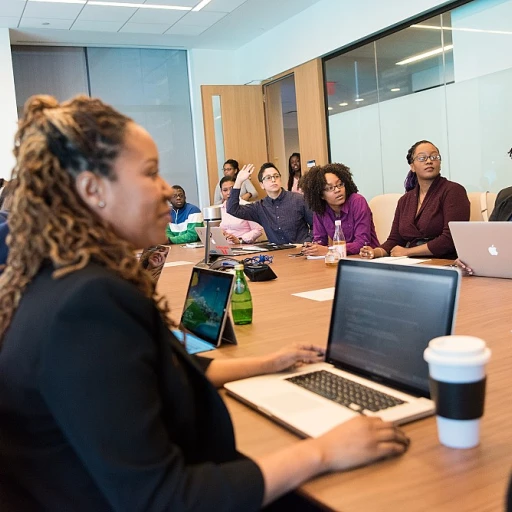
Understanding the role of HR in sales workshop strategies
The evolving partnership between HR and sales
Human Resources leaders are playing a more strategic role in shaping sales workshop strategies than ever before. In today’s business landscape, HR is not just about hiring or compliance. Instead, HR teams are actively involved in developing training programs that help sales reps and managers build real skills, improve product knowledge, and adapt to complex sales environments.
Why HR’s involvement matters in sales training
Sales workshops are no longer just about traditional selling techniques. They are about creating learning experiences that drive real business results. HR leaders bring expertise in adult learning, feedback, and inclusive program design, ensuring that every participant—from new sellers to experienced sales managers—benefits from the training. This approach helps teams learn best practices, engage in role playing, and receive real time feedback, which is essential for effective sales enablement and sales coaching.
Aligning sales workshops with business strategy
When HR collaborates with sales management, the result is a strategy workshop that is tailored to the specific needs of the business. This alignment ensures that training ideas are not generic but are focused on the real challenges and opportunities facing the sales team. HR’s ability to create targeted training programs means that every session is relevant, actionable, and tied to measurable outcomes.
Building a culture of continuous learning
HR leaders are uniquely positioned to foster a culture where learning is ongoing and feedback is valued. By integrating sales training into broader talent development initiatives, HR helps team members continuously upgrade their skills and adapt to changing market demands. This commitment to learning not only benefits individual reps but also strengthens the entire sales team.
Learning from proven methodologies
To design effective sales workshops, HR can draw inspiration from established frameworks and consulting best practices. For example, exploring Six Sigma consulting for sales training can provide valuable insights into process improvement, data-driven decision making, and continuous improvement—principles that are just as relevant in sales as they are in operations.
Identifying key objectives for your sales workshop
Clarifying What Success Looks Like
Before launching a sales workshop, it’s essential to define what you want to achieve. Clear objectives help guide the design of your training program and ensure that every activity, from role playing to feedback sessions, aligns with your business goals. For HR leaders, this means collaborating with sales managers and team members to pinpoint the specific skills and knowledge gaps that need attention.
- Boosting product knowledge: Will your sales reps benefit from deeper understanding of your offerings?
- Improving selling skills: Are you aiming to enhance negotiation, prospecting, or closing techniques?
- Encouraging real-time learning: Do you want participants to practice complex sales scenarios and receive immediate feedback?
- Fostering team collaboration: Is the goal to help sellers and other team members work together more effectively?
- Supporting sales enablement: Should the workshop introduce new tools or best practices for sales management?
Setting measurable objectives will help you track progress and demonstrate the impact of your training program. For example, you might aim to increase sales reps’ confidence in handling objections, or to shorten the sales cycle through better communication. These targets should be realistic and tailored to your team’s current challenges.
Aligning Objectives with Business Strategy
Effective sales training programs are not one-size-fits-all. They must reflect your company’s unique strategy and market position. HR leaders play a key role in ensuring that the workshop objectives support broader business goals, such as entering new markets or improving customer retention. This alignment helps create a more meaningful learning experience for participants and maximizes the return on your investment in training sales teams.
For more insights on how business strategy shapes learning and development, explore this resource on the role of a business strategist.
Making Objectives Actionable and Relevant
Once you’ve identified your key objectives, break them down into specific, actionable outcomes. For example, instead of a broad goal like “improve sales performance,” focus on measurable results such as “increase the number of qualified leads generated by each sales rep by 20 percent within three months.” This approach will help you design workshop activities that are relevant to real life challenges and ensure that participants can apply what they learn in real time.
By taking the time to clarify and align your objectives, you set the stage for a successful strategy workshop that delivers lasting value to your sales team and your business.
Selecting the right facilitators and participants
Choosing Facilitators Who Understand Sales and HR Dynamics
Selecting the right facilitators is crucial for a successful sales workshop. Facilitators should not only have strong experience in sales training and sales management, but also understand the unique challenges HR leaders face. This blend of expertise will help create a learning environment where both sales reps and HR team members feel supported. Look for facilitators who have led training programs focused on real life selling scenarios, role playing, and sales enablement. Their ability to provide real time feedback and adapt to the needs of participants will help maximize the impact of your strategy workshop.Building a Diverse and Relevant Participant Group
The effectiveness of your workshop depends on having the right mix of participants. Include sales reps, sales managers, and HR professionals who are directly involved in sales training or sales coaching. Consider inviting team members from different business units to bring diverse perspectives and best practices. This approach will help address complex sales challenges and foster cross-functional learning. When selecting participants, think about:- Current skill levels and training needs
- Roles in the sales process (from sellers to support staff)
- Experience with previous training programs
- Ability to contribute to real time discussions and feedback
Aligning Facilitators and Participants with Workshop Objectives
To ensure your sales workshop delivers value, align the skills of facilitators and the backgrounds of participants with your specific objectives. If your goal is to improve product knowledge, choose facilitators with deep expertise in your offerings and participants who interact with customers. For workshops focused on sales strategy or complex sales, include sales managers and HR leaders who can share insights from real business cases. This alignment will help create a training program that is both practical and relevant.Leveraging External Expertise for Unique HR Challenges
HR leaders often face challenges in bridging the gap between traditional HR functions and sales enablement. Bringing in external facilitators with experience in change management or sales coaching can provide fresh perspectives. For more on navigating organizational change in HR-led sales initiatives, see this resource on navigating change management in non-profit organizations. Their insights can help tailor your training ideas to the specific needs of your sales team and business context.Encouraging Active Participation and Continuous Learning
Finally, create an environment where all participants feel encouraged to share feedback, ask questions, and engage in role playing. This will help reinforce learning and ensure that the training program delivers lasting benefits. Consider follow-up sessions or ongoing sales coaching to support continuous improvement and real time application of new skills.Designing engaging and inclusive workshop activities
Crafting Activities That Drive Real Learning
When designing a sales workshop for HR leaders, the focus should be on creating activities that are both engaging and inclusive. The goal is to help participants build real skills that translate into improved sales performance and stronger team collaboration. Here are some practical approaches:- Role Playing for Real-Life Scenarios: Encourage sales reps and team members to participate in role playing exercises that mirror complex sales situations. This method helps sellers practice their selling techniques, receive immediate feedback, and refine their approach in a safe environment.
- Interactive Case Studies: Use real business cases relevant to your industry. This will help participants connect theory to practice, analyze strategies, and discuss best practices for sales enablement and management.
- Group Problem-Solving: Divide participants into small teams to tackle specific sales challenges. This collaborative approach fosters learning, encourages diverse perspectives, and helps develop creative solutions that can be applied in real time.
- Product Knowledge Sessions: Integrate product training into your workshop program. Sales reps and managers benefit from deepening their understanding of the products or services they are selling, which is essential for effective sales training and coaching.
- Peer-to-Peer Feedback: Build in time for team members to give and receive constructive feedback. This not only enhances learning but also strengthens trust and communication within the sales team.
Ensuring Inclusion and Engagement
To maximize the impact of your training program, consider the diverse backgrounds and learning styles of your participants. Here are some tips:- Use a mix of training ideas, such as discussions, hands-on activities, and digital tools, to engage all types of learners.
- Encourage participation from every attendee, not just the most vocal. Assign rotating roles or responsibilities during activities to ensure everyone is involved.
- Adapt activities for both in-person and virtual formats, making sure remote team members can fully participate in real time.
Measuring the impact of your sales workshop
Tracking Progress with Clear Metrics
Measuring the impact of your sales workshop is essential for HR leaders who want to ensure their training programs deliver real business value. Start by defining specific, measurable objectives that align with your sales strategy. These could include improvements in product knowledge, selling skills, or the ability of sales reps to handle complex sales scenarios. Tracking progress over time will help you identify which training ideas are most effective for your team.
Gathering Real-Time Feedback
Collecting feedback from participants during and after the workshop is crucial. Use surveys, quick polls, or informal discussions to understand what worked and what needs improvement. Encourage team members to share their experiences with role playing, sales coaching, and other activities. This real-time feedback will help you adapt your training program to better suit the needs of your sellers and sales managers.
Assessing Skills and Knowledge Application
To measure the true impact, look beyond immediate reactions. Assess how well sales reps apply new skills in real life situations. This can be done through follow-up sessions, observing sales calls, or reviewing sales performance data. The goal is to see if the workshop helped create lasting changes in behavior and improved sales results.
Linking Outcomes to Business Results
Ultimately, the success of your sales training program should be reflected in business outcomes. Monitor metrics such as increased sales, shorter sales cycles, or higher customer satisfaction. Compare these results to your initial objectives to determine the effectiveness of your strategy workshop. Sharing these insights with your team will help reinforce best practices and support ongoing learning and development.
Addressing challenges unique to HR leaders in sales workshops
Overcoming Resistance and Building Engagement
HR leaders often face unique challenges when running a sales workshop, especially when participants come from diverse backgrounds or have varying levels of experience in selling. Resistance to new training programs or skepticism about the relevance of sales training for HR professionals can slow down progress. To address this, it’s important to create an environment where team members feel comfortable sharing their concerns and feedback in real time. Encourage open dialogue and use role playing or real life scenarios to demonstrate the direct impact of sales skills on business outcomes.
Bridging the Gap Between HR and Sales Teams
Another common challenge is aligning the objectives of HR with those of the sales team. HR leaders must help participants see how their learning and development efforts support the overall sales strategy. This can be achieved by integrating best practices from both HR and sales management, ensuring that training ideas are relevant and actionable. Including sales managers and reps in the design of the workshop will help tailor the program to address specific business needs and foster a sense of ownership among all participants.
Managing Time Constraints and Maximizing Impact
Time is often limited, and balancing the demands of a busy sales team with the need for comprehensive training can be difficult. To maximize impact, focus on concise, high-value activities that build product knowledge and selling skills. Consider breaking the workshop into shorter, focused sessions or using blended learning approaches to accommodate different schedules. Real time feedback and ongoing sales coaching can reinforce learning and ensure that skills are applied on the job.
Ensuring Lasting Change Through Follow-Up
One-off workshops rarely lead to lasting change. HR leaders should implement follow-up strategies, such as ongoing training sales programs, peer learning groups, or regular check-ins with sales enablement teams. This approach helps reinforce new skills, track progress, and adapt the program to evolving business needs. Measuring the effectiveness of your strategy workshop and gathering feedback from participants will help you continuously improve your training program and drive real business results.













